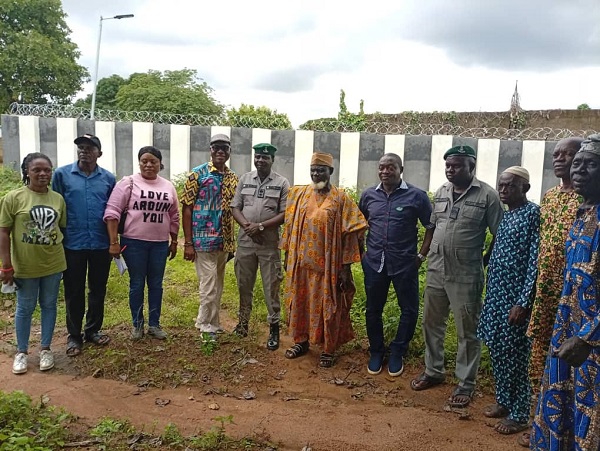To strengthen Nigeria’s non-oil export base and formalise informal trade flows, the Nigerian Export Promotion Council (NEPC), in collaboration with the Nigeria Customs Service (NCS), the National Bureau of Statistics (NBS), West African Cross-border Trade and Agricultural Fair (WACTAF), and other key actors, embarked on a three-day stakeholder s’engagement in Ṣaki and Oke-Ogun in Oyo State.
The engagement, held on July 9, was part of NEPC’s Informal Cross-Border Trade (ICBT) programme, designed to integrate informal exports into Nigeria’s official economic data.
A visit to Okerete, a border community in Saki West LGA that connects Nigeria to the Benin Republic, was central to the mission. Okerete is a major trade route for Nigerian exports heading to Mali, Senegal, Côte d’Ivoire, and beyond.
The delegation comprised representatives from NEPC, NCS, NBS, the Oyo Shippers Association, Oyo State Ministry of Trade, and trade advocates, including Alhaji Nasiru Salami, Dr Abdulwaheed Ayobami Omotosho, and Dr Joe Itah.
Despite the 86km stretch between Ṣaki and Okerete, the delegation endured a six-hour journey due to poor road infrastructure. Along the route, they encountered numerous export activities, particularly trucks loaded with goods, many of which exceeded ECOWAS axle load standards.
The team engaged with local stakeholders, including traditional rulers, traders, logistics operators, and market consolidators, to build consensus on formalising existing trade practices, collecting accurate data, and enhancing Nigeria’s non-oil export performance.
Mrs Bolanle Emmanuel, Acting Regional Coordinator of NEPC (South West, Lagos Office), emphasised the Council’s mission: “NEPC has the role to mainstream non-oil exports and promote formal exports in Nigeria.”
Emmanuel continued, “We are here to sensitise on the requirements for formal cross-border trade and understand Customs duties and levies. That’s why Customs is here—to guide us. They are our friends.” Knowledge of required documentation, customs duties, and levies will facilitate accurate data capture and profitable formal export businesses.
Alhaji Nasiru Salami, an export facilitator, was on the team and stressed the need for functional border markets.
“Okerete was chosen for the South-West. Traders from Ṣaki are the ones trading here. If we have functional border markets, the economy and our people will benefit,” he explained.
Representing the executive director/CEO of NEPC, Mr Afolabi Bello linked the export agenda to macroeconomic stability. “When the dollar rises against the naira, it’s our responsibility to act. Export earns foreign exchange to fund infrastructure. But without records, government intervention is impossible.
“If we show that two trailers leave Ṣaki daily, government support will follow,” he said, urging traders to collaborate with the NBS in documenting products like cashew and shea butter.
A retired NEPC director, Dr Joe Itah, noted Ṣaki’s global recognition for quality exports. “Ṣaki is visible on the world map for shea butter and cashew. The NEPC Executive Director, Mrs Nonye Ayeni, has mandated that we strengthen formal trade here.
“Infrastructure is a challenge, but with support from traditional rulers like the Kabiyesi of Ṣaki, improvements will come,” he said.
Speaking from a royal perspective, Kabiyesi Oba Khalid Olabisi Oyedepo III, the Okere of Ṣaki, encouraged exporters to collaborate. “Form cooperatives to share transport costs and get bulk discounts. When you export, you help yourselves and strengthen the naira,” he said.
According to the monarch, “Foreigners are profiting from our resources. One Indian claimed his company has made ₦1.7 billion here. Let us reclaim our trade. Much of what’s called Ogbomoso cashew comes from Ṣaki,” he noted.
Mr Emmanuel Akanni of Fidelity Bank reaffirmed the bank’s support for export businesses. “Ṣaki is a hub for cocoa, cashew, and more. With government support, Fidelity Bank is ready to assist traditional institutions and NEPC. Proper documentation is key to accessing financing,” he said.
Responding, the monarch urged Fidelity Bank to open a branch in Ṣaki to ease financial access.
Delivering the goodwill message of the Oyo State commissioner for trade, industry, investments and cooperatives, Honourable Adebisi Adeniyi, Mr Oluwole Uthman, an officer from the ministry, outlined the state’s commitment to formalising cross-border trade in Saki. He stated that the government’s strategy is anchored on four key areas: registration and enumeration of traders, provision of basic infrastructure, deployment of trade facilitation officers and relevant agencies, and training and capacity building for women and youth engaged in trading.
“We are also committed to promoting cross-border cooperatives and market associations to ensure proper coordination and sustainability of trade activities,” Uthman said on behalf of the commissioner. He noted that these measures are part of Oyo State’s broader efforts to improve trade governance, boost economic growth, and empower local traders in the border region.
Dr Ayobami Omotosho, president-general of the Okerete Border Market Stakeholders Association, praised NEPC’s efforts and called for a permanent Customs/security post. “Our shea butter is now world-class. NEPC has helped us develop value-added cashew products.
“The Kabiyesi is working hard, soon we’ll commission a border post,” he said.
The chief superintendent of the Nigerian Customs Service (Oyo/Osun Area Command), Mr U. D. Bukar, enlightened the audience on what exporters need as documents when exporting.
“Exporters need NAFDAC certificates, TIN, export licenses, and must pay duties,” he said.
The chief superintendent said, “We check arrival assessment reports, certificates of origin, and more to ensure compliance and revenue growth.”
He also broke down the formal documentation requirements: “CAC registration, TIN, NEPC Export Certificate, Form M (import), NXP (export), SONCAP, NAFDAC, and Certificate of Origin,” he said, must accompany any exporter whose goods are going through the border.
He listed key levies: 0–35% import duty, 7% surcharge, 0.5% ETLS levy, 1% CISS, and 7.5% VAT. Supporting docs include the SGD form, duty receipts, exit notes, PAAR, and transit bond.
The engagement ended with renewed stakeholder commitment to formalising the vibrant but largely untracked cross-border trade around the Ṣaki–Okerete corridor, laying the foundation for stronger infrastructure, accurate data, and more inclusive economic growth.





